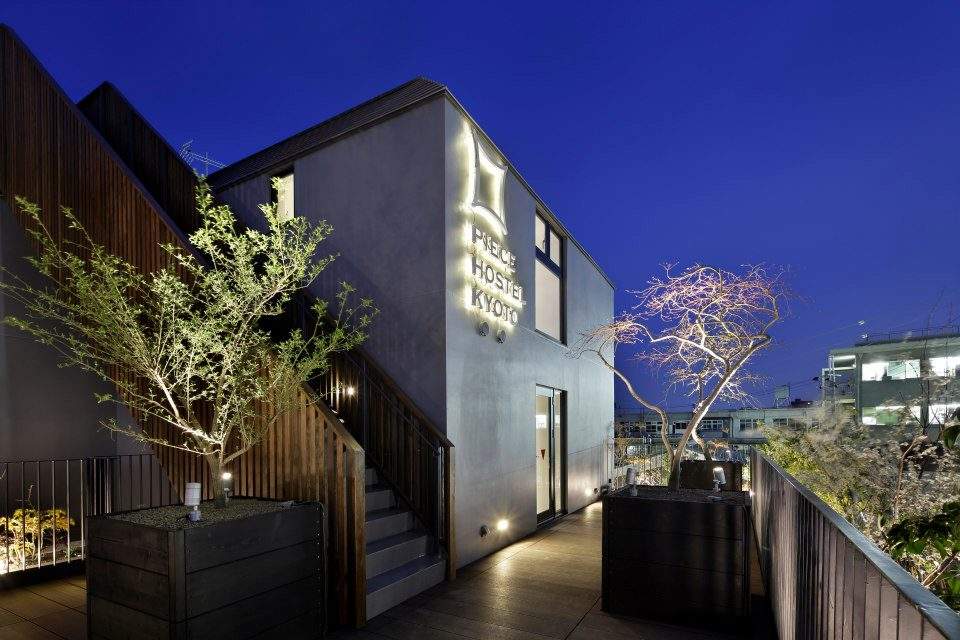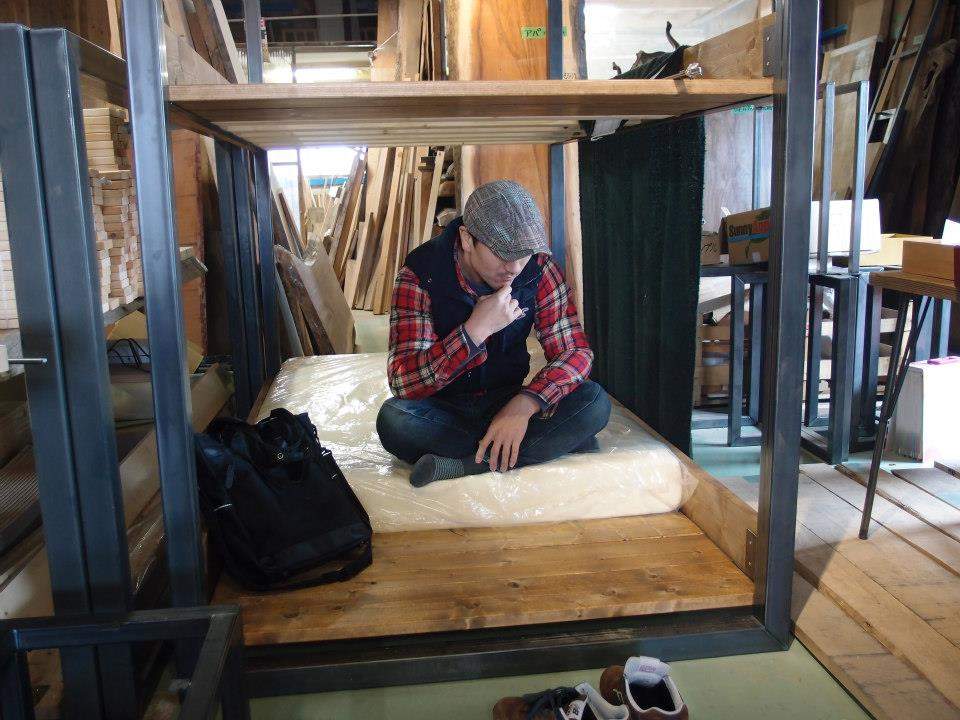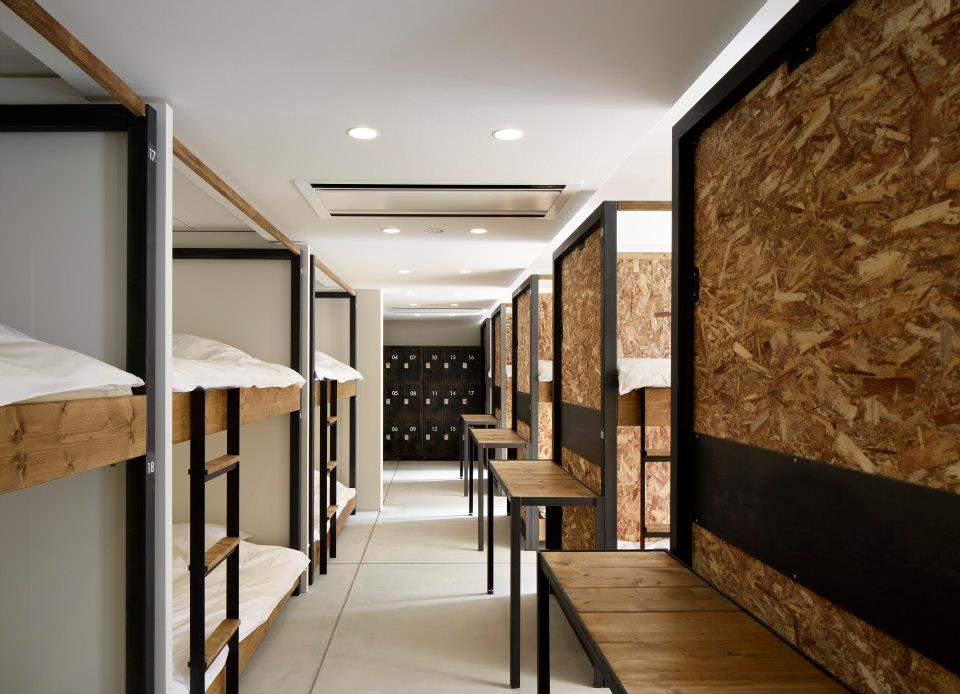How many of you have uttered that statement before?
Opening a hostel is not an uncommon dream among travelers who return from a trip around the world, and in principle, it sounds like a great idea: get to sit around all day swapping travel tales with everyone who passes through your hostel door and get paid for the pleasure.
But is the dream the same as the reality?
At 31 years of age, after several years living in Taiwan, studying architecture in London, and undertaking his own travels through Europe, Asia, and Africa, Japanese born Nobu Tabata did exactly that. Starting with a blank sheet (in fact a parking lot) just six months previously, Nobu has turned grey concrete into a 132-bed hostel in Kyoto, Japan.
With his new business in its infancy, having been open for under a month, I had the opportunity to speak with Nobu about the highs and lows of the hostel industry. If you’re thinking about opening a hostel, Nobu provides an insight into the reality of your dream in this interview.
What inspired you to open a hostel?
- My family runs a property investment business that specializes in building and renting out apartments. Together with my background in architecture, I knew I wanted to do something with property and providing accommodation.
- I recognized the high levels of tourism in the Kyoto and thought it presented a good opportunity to expand the existing business into the hotel industry.
- I considered a number of different accommodation types but decided that a guesthouse-style business would be more interesting.

Talk me through the start-up process
- From conception to opening, the start-up took three years, which involved completing designs for ten different properties, nine of which never got off the ground.
- Managing the design was complex, trying to achieve a balance between making rooms as small as possible to maximize space, provide comfort, and integrate an interesting common space.
- There are lots of rules in Kyoto, including restrictions on building above a certain level, so that was a challenge that took up time during the start-up years.
What was the most important factor you had to consider during the development phase?
- Location is vital. Opening a hostel business is not like buying a bag – you can’t change it later, so you need to be certain it is right from the beginning.
- Ideally I wanted the hostel to be on the north side of Kyoto station near Kyoto Tower, which is a more popular area, but the restrictions are greater there, and the area’s popularity pushes up the property prices.
- So, I ended up buying land on the south side of Kyoto station. Although it isn’t as popular as near Kyoto Tower, the location provides excellent access to the station, is within walking distance of many of the main sights, and being in the south meant that the land was cheaper.
- I chose a location that is down a narrow road and has properties facing the hostel. In Japan, that is seen as a less desirable location, but factoring that many travelers would not be put off by the small side-street or neighboring properties, I went ahead and secured a good price in the process.
- There were some challenges, predominantly gaining access to the land during the building stage – with a narrow road and close neighbors, truck access was tricky, but I negotiated a rental arrangement with the parking lot behind the land, which allowed access from there.
Why did you choose a new build over renovating an existing property?
- Efficiency is the main reason. The most cost beneficial layout for a hotel or hostel involves long corridors with rooms coming off both sides, while a square design wastes a lot of space in the middle of the building. Creating a space from scratch is always going to be better.
Did you do much research looking at other hostels?
- Research was really important, and I visited many other hostels in Kyoto, speaking with lots of owners. My main discovery was that people don’t like to sleep in dorms, they do it because they like cheap accommodation. This was an important factor in the design – our dorm rooms having walls on three sides and a curtain to provide maximum privacy in a shared space.
How did you deal with the financial aspects?
- Although I set up Piece Hostel through the family property investment company, most of the finance (80%) came from the bank, and convincing the bank to provide a mortgage took a lot of time during the three year start-up period because banks here are not familiar with the hostel market.
- I needed to compile a detailed business plan dealing with price, capacity, the local area and size of the backpacking market as well as the expected return on investment.
- Fortunately, the return for a hostel business is better than the equivalent return for a hotel business because there are fewer costs, most notably in relation to cleaning. In a business hotel in Japan, it is expected that the sheets are changed every day. One of the biggest costs in an accommodation business is human resources, and with backpackers generally happy to have the sheets changed only when they move out (for a short stay), this leads to lower costs.
What has been the hardest part about setting up?
- Knowing (or not knowing) how many people would come. The hostel has room for 132 people, but it is very difficult to predict the market and likely success of the hostel.
- I was also worried about guest behavior. I designed the hostel to a high specification (I have Macs and bespoke furniture), and I wasn’t sure whether things would get stolen or damaged.
- And the showers – I wasn’t sure if there would be enough, though now I’m open, it seems that there are (there are no queues).
- Also, when you design a hostel, it needs to be as future proof as possible because it is a business that must last at least 25 years, until the mortgage is paid off. So one of my biggest concerns was designing a place that maintains its advantage even as other hostels come about.
What have you done to differentiate Piece Hostel from the other hostels in Kyoto?
- It is important to be different in order to take the competitive edge, and we started by offering a free breakfast with a choice of toast, rolls, jams, and spreads as well as a more traditional Japanese breakfast option that includes rice and miso soup. We did this on a trial basis as none of the other hostels offered breakfast, and seeing how successful it has been, we will keep this as a standard feature.
- I’ve also included a large number of private rooms, as I think the market will start to lead away from dorms. Most of the travelers who stay are two people, making it cost efficient to share a private room.
- The design was also important. Our furniture is made to order, including the dorm beds. I felt that standard single bunks were too small, so I had larger beds designed for a better experience.

What mix of guests do you get staying at the hostel?
- At the moment around 95% of our guests are from overseas. However, I hope over time to change that ratio to a 60:40 split of international to Japanese guests. Most travelers would agree that a chance to live with and meet local people makes for a more interesting stay.
- Of those staying, most of them are couples or pairs (friends) from Europe and the USA.
- The age range is wider than expected, too. I had one guest last week who was 70 years old!
- There are also lots more families than I expected, especially arriving from Southeast Asia.
- Overall, people tend to come and stay for a few nights before moving on.
Did anything come easier than you thought?
- I was really surprised to find that the hostel has received reviews quicker and easier than I’d thought.
How do you market the hostel?
- Everything is done online. I have the property listed on Hostelbookers, Hostelworld and Booking.com. However, down the line I intend to do more marketing to Japanese visitors to increase the number of Japanese guests.
What is the work-life balance like when you run a hostel?
- Overall I didn’t think the process would take this long, and the day to day work hours are long (working until 2 a.m. is not uncommon), but now that we’re open, I’m hoping to work a bit less.
- At the beginning it is important to get good staff and provide detailed training, so that ultimately you can delegate. But you need to set up systems first and learn to do it yourself before you can train your staff.
What is the worst part of your day?
- Cleaning! Every day between the hours of 11 a.m. and 3 p.m. all of the staff clean. Although the hostel is new and is nice and clean, keeping it that way is hard – have you any idea how much hair 132 people can leave in the showers?!
- When you spend so long working on a property, it feels like your baby – it feels like home – and then people come in and make it dirty, which can be tough. But guests have been much politer and cleaner than I expected. They do their dishes; they are respectful of each other and generally keep up the cleanliness, which I think, is a positive circle, making the next guests want to keep the hostel clean, too.

Tell me about the name: Piece Hostel – what’s the idea behind that?
- When I opened the hostel, I didn’t want it to represent Kyoto. You won’t see much of the architecture or design of the city within the hostel. Instead I want to encourage people outside to see Kyoto. That is why I named it Piece Hostel – we don’t want to represent your time in Kyoto, we simply want to be a piece of your experience in the city.
What are your future plans for Piece Hostel?
- I want to improve the common space, so it isn’t just a place to hang out. I want it to be a community where people can communicate with each other. I’m going to put a whiteboard up with a map of Kyoto where guests can write tips as well as space for them to leave messages for each other. Luxury hotels are a place to relax. I want Piece Hostel to be a place for active travelers.
- I’m also going to provide more books about Kyoto as well as offer tours, but I want to do things differently. For example, I’d like to provide cycling tours around the city and further out – most people don’t know that you can go by bike on a riverside path to Arashiyama.
- Ultimately, expansion is in mind. Most backpackers travel throughout Japan. But if we do expand, I’d be looking for a city with less competition. I don’t want for us to be a chain as such. If we do open more properties, they will be different types offering different experiences, the only consistency being the assurance of the quality that comes with staying at a Piece Hostel.
What is your measure of success for the hostel – good reviews, full beds, or maximum money?
- If we can make a difference to someone’s trip, we have been a success. Hopefully this in turn will lead to good reviews. From there, I’d hope for full rooms, and from that, the money should come.
Do you have any tips for wannabe hostel owners?
- Yes, the most important point is that operating a building is a long investment. You need to think 20 to 30 years in advance, anticipating how competitors will respond and how traveler needs will change. However, it can be very difficult to predict things that far in advance – lots can change in 30 years, and yet you need to think that far ahead as you won’t pay your mortgage back in 5 years.
- You also have to love what you do, which is providing a service and meeting people – the hours are long and it can take years to get the business started.
- As well as all that, you need to be able to thoroughly evaluate the market as well as judge your hostel fairly and objectively.
- But perhaps most of all, you need to be able to make things happen. There is no ‘try’ in this business, only ‘do’ or ‘do not’ – if you only ever try, nothing will get done.
Nobu has proven that opening a hostel can become more than a dream, but it is not without effort, hard work, and a few unanticipated difficulties along the way.
Do you have what it takes to deal with the hair from 132 travelers?
To read more about hostels and the business side of travel, check out the following articles:

Photo credits: Eviled, all other photos courtesy of Piece Hostel and may not be used without permission.